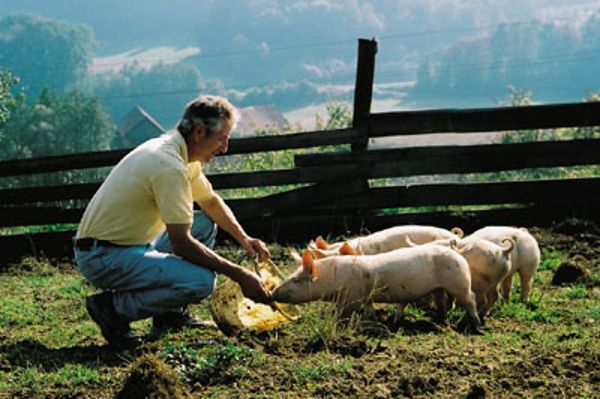Advantages of organic farming

Among all forms of land management, organic farming is considered to be the most environmentally friendly one.
Holistic, networked thinking and the most closed farm cycle possible with a diverse structure are the foundations and a prerequisite for successful organic farming. In this way the natural resources of soil and water are conserved and passed on to future generations.
Organic farming...
...promotes the circular economy
Compost is thus produced and applied to the land to recycle organic material and valuable plant nutrients. Manure, liquid manure and slurry are used as farm fertilisers or legumes are grown to fix nitrogen in the soil.
...revitalises the soils
Soil life is promoted by means of gentle tillage, selective crop rotations, and the application of compost and well-prepared farm manures. In this way soil nutrients are activated and the humus content is increased. The targeted cultivation of legumes and field fodder has a positive effect on soil fertility. The goal is an intact soil system.
...counts on animal-friendly husbandry
Husbandry systems with outdoor runs or grazing are particularly animal-friendly. The feed comes from organic farming and no preventive veterinary medicines are used. More space in the stable, soft resting areas, manipulable material and feed with a high share of raw fibre for ruminants are also a prerequisite.
...preserves species and habitat diversity
By avoiding the use of synthetic chemical plant protection products, biodiversity is promoted on the cultivated land. For example, an Austria-wide insect study (BML, DaFNE) indicates that organic farming has a positive effect on insect density. The use of rare plant varieties or animal breeds contributes to the conservation of genetic diversity.
...protects the climate
Greenhouse gases are saved by using regional fodder and avoiding synthetic nitrogen fertilisers. The humus build-up is promoted, resulting in a higher water storage capacity. In addition, organic soils can bind more CO2 due to humus-promoting management actions
...protects the resource water
By avoiding the use of synthetic chemical plant protection products and by keeping the number of animals per hectare of farmland mostly low, organic farming helps to keep both surface waters and groundwater clean. Targeted soil cover (catch crops, undersowing) results in less evaporation during drought.
...is guaranteed GMO-free
Organic farming is guaranteed GMO-free, and processed food must not contain any genetically modified ingredients and food additives. Animals are not fed with genetically modified feed.
...is regularly controlled
The production of organic food is controlled even more strictly than that of conventionally produced food. At least once a year, organic farms - from field and stable to processing and marketing - are inspected by independent and officially approved control authorities.
...has standardised rules in the EU
The EU Regulation No 2018/848 lays down the rules for the entire production of organic products (production, inspection, imports) in the EU.